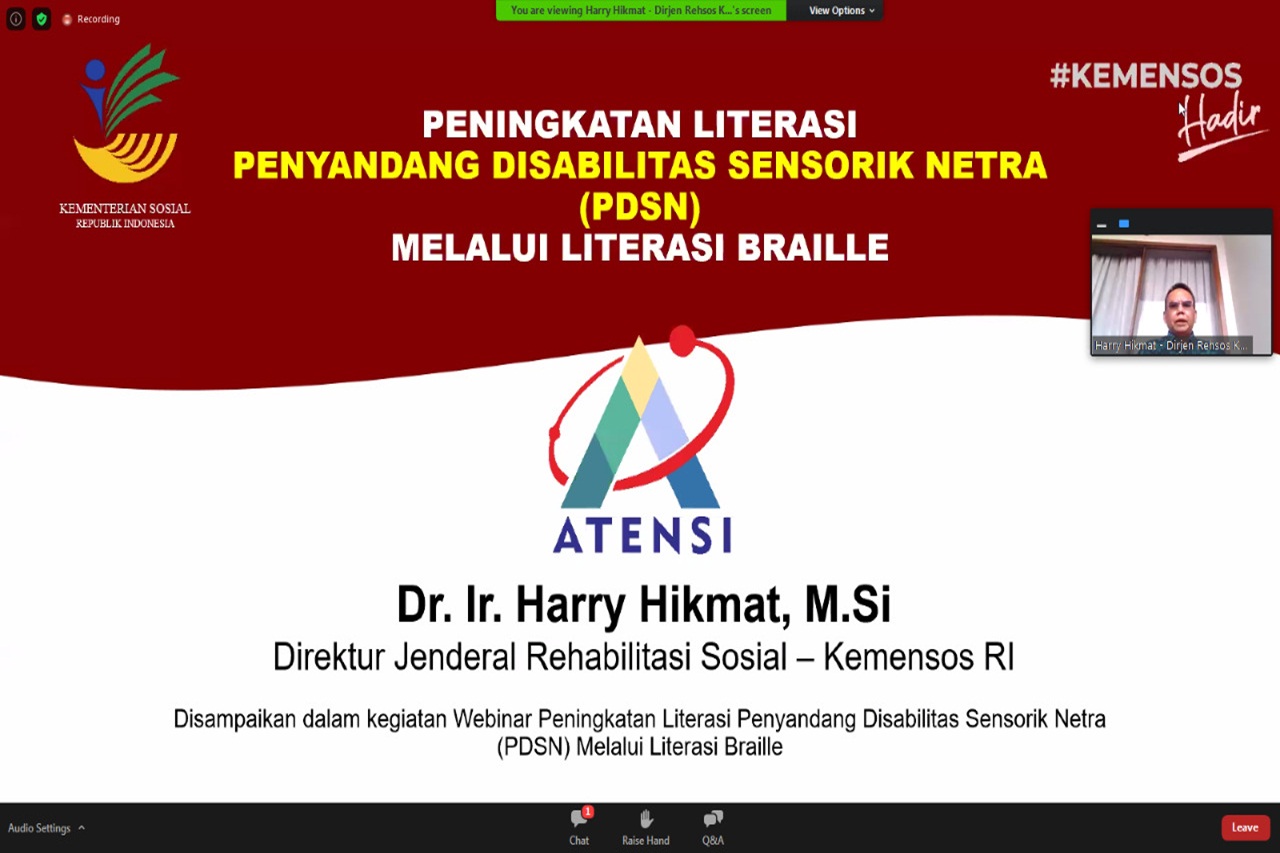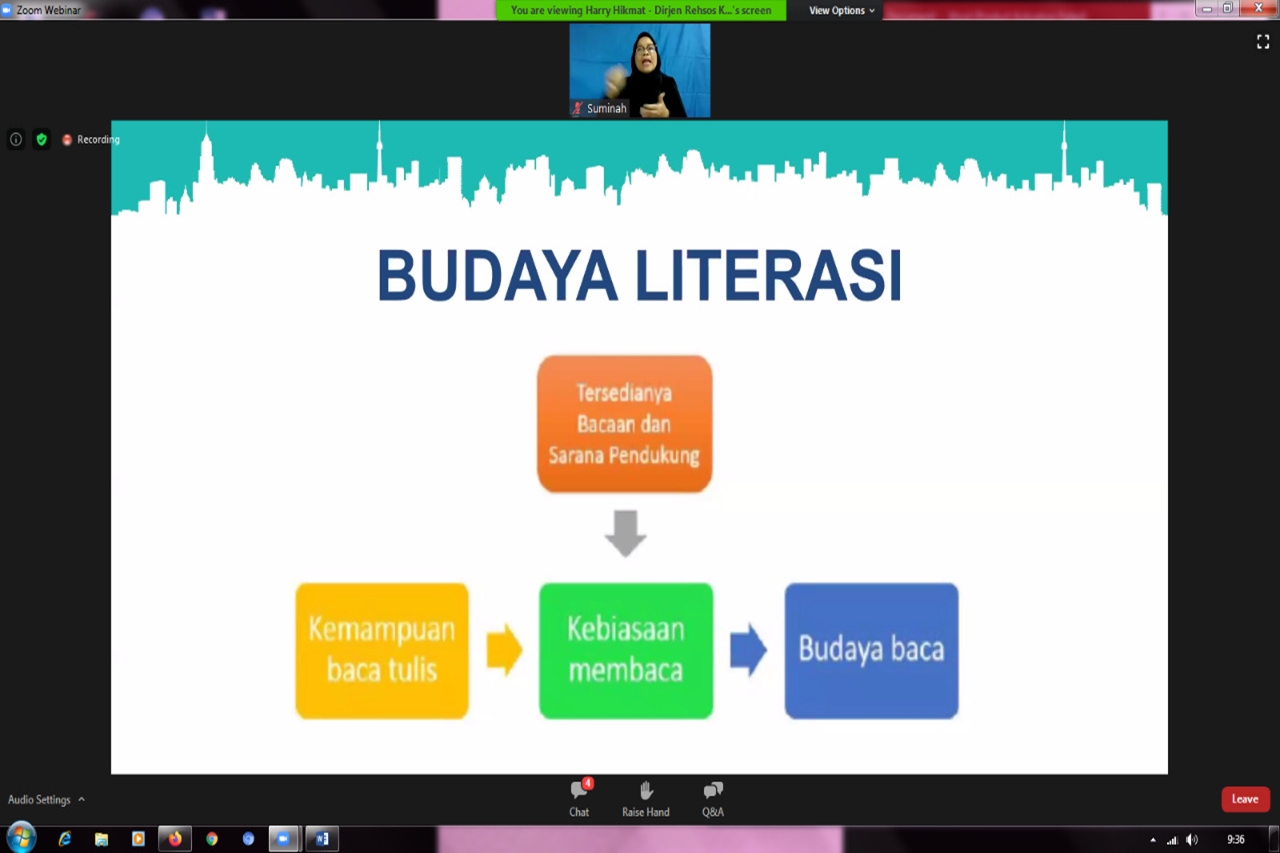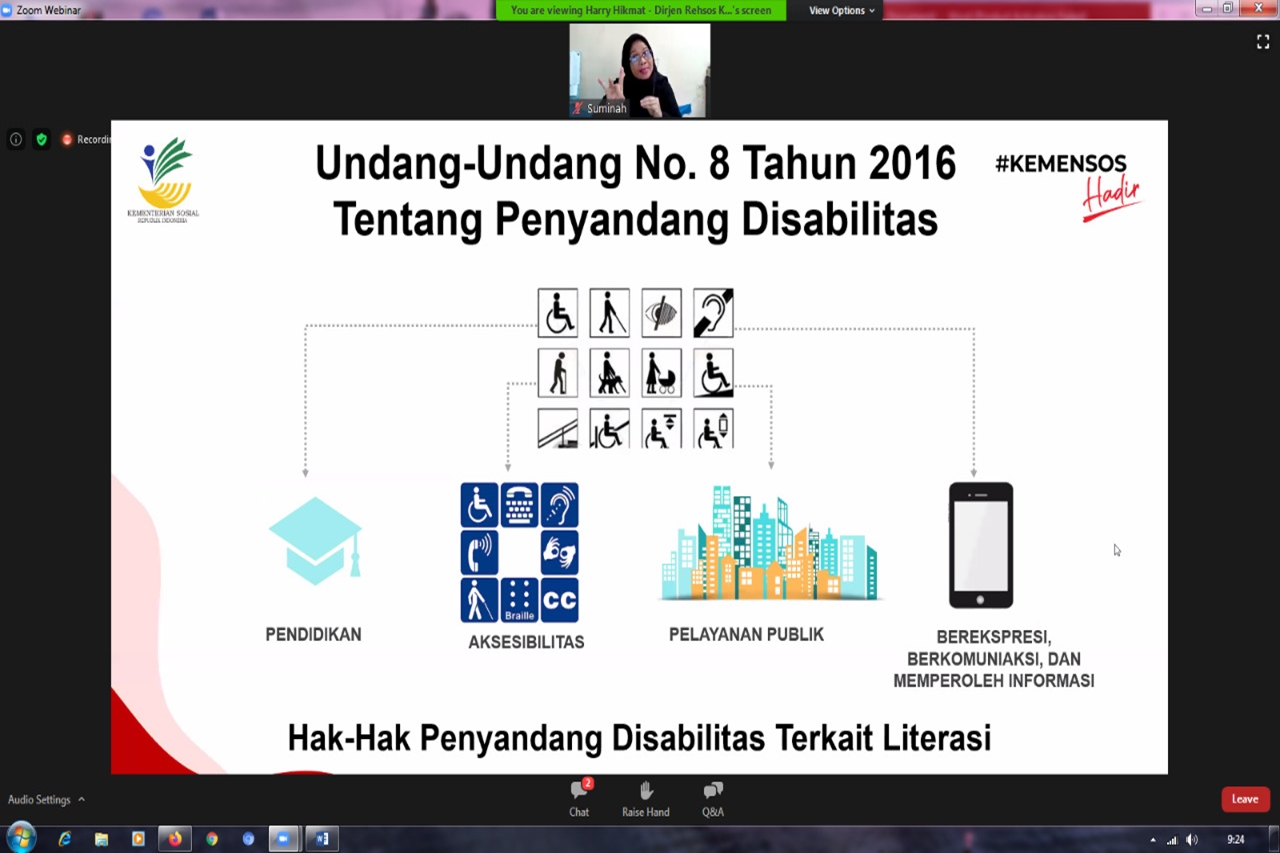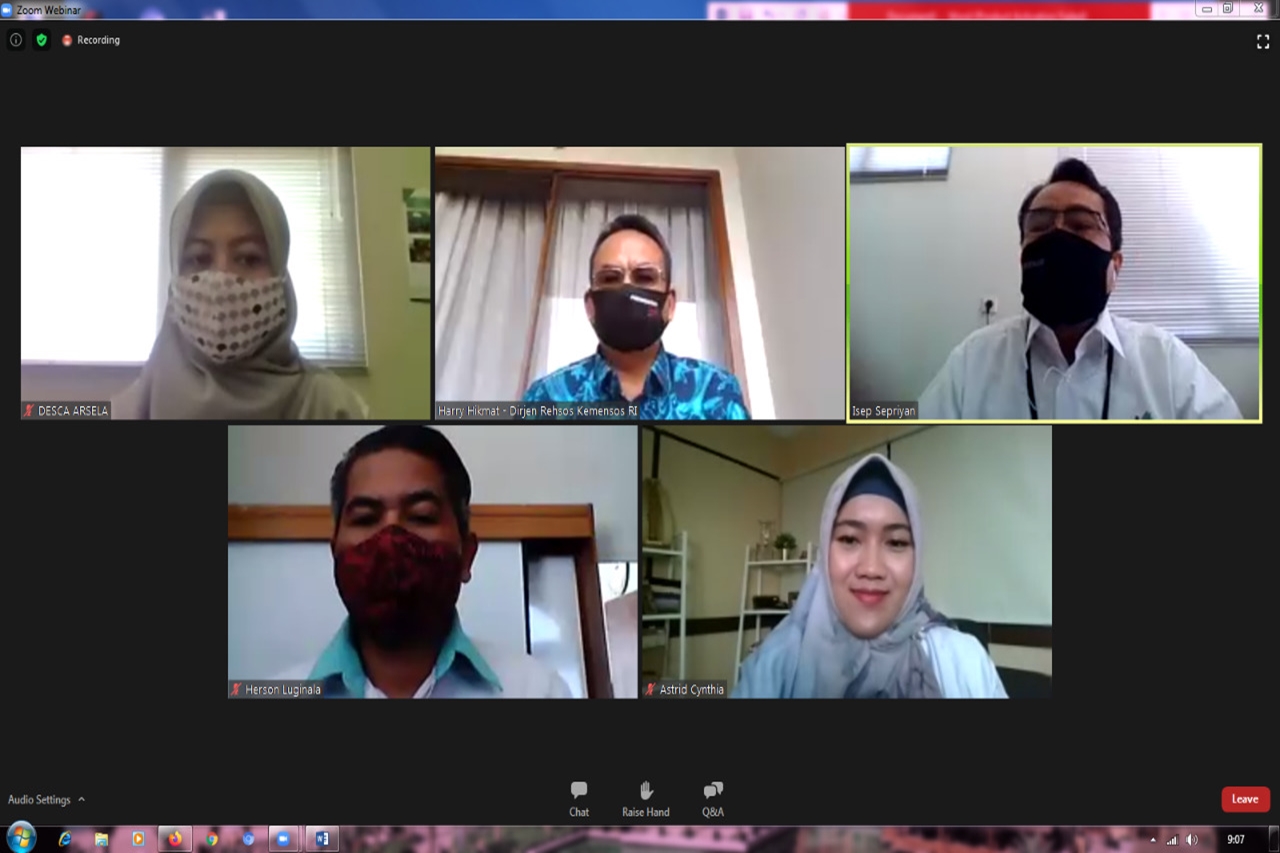Writer :
OHH Ditjen Rehsos
Editor :
Annisa YH
Translator :
Intan Qonita N
BOGOR (August 27, 2020) - Fulfilling the right of accessibility for people with visual disabilities is an objective that the government continues to strive for, one of which is access to literacy.
One of the Technical Implementation Units of the Indonesian Ministry of Social Affairs that manages braille literacy is "Abiyoso" Literacy Center in Cimahi. This center is under the auspices of the Directorate General of Social Rehabilitation of the Indonesian Ministry of Social Affairs.
"This center is a national reference center and laboratory for developing braille literacy on a national scale," said the Director General of Social Rehabilitation, Harry Hikmat in the webinar on Improving the Literacy of People with Visual Disabilities (PDSN) through Braille Literacy.
The rights of persons with disabilities to literacy are enshrined in Law Number 8 of 2020. Starting from the right to have an education, the right to accessibility, the right to public services to the right to express, communicate and obtain information.
Based on the 2015 Socio-Cultural Statistics, the population over 10 years old who accesses television media is inversely proportional to access to radio and newspapers. The percentage of the population who accesses television is 91.47%, while the population who accesses newspapers has decreased every year to 13.11%.
This explains that the effort to think about this literacy strategy does not only rely on methods for reading. The Ministry of Social Affairs continues to build literacy that leads to a reading culture. However, if there are limitations, braille literacy technology is specifically developed.
"Therefore, one of the innovations of the Cimahi "Abiyoso" Literacy Center, namely Talking Books, can facilitate PDSN to access reading materials. Starting from textbooks, story books to psychosocial therapy books that are already available at the Center," said the Director General of Social Rehabilitation.
In addition to Talking Books, previously the "Abiyoso" Cimahi Literacy Center has also produced braille books, audio mobile libraries, digital pens and tactual maps.
The production of braille books continues to this day to meet the needs of Special Schools (SLB), PDSN Social Rehabilitation Centers/Organizations and Social Welfare Institutions that have a concern for PDSN.
The achievement of the fulfillment of disability rights is still relatively low based on the 2018 Susenas. Access to information for groups with disabilities aged 15 years and over is still 34.89% who use cellphones or laptops and only 8.5% have access to the internet.
Until now, the Ministry of Social Affairs is very open to building cooperation so that the innovations created by the "Abiyoso" Cimahi Literacy Center can be produced massively. The private sector and CSR are also welcome to take part.
The Director of Social Rehabilitation for Persons with Disabilities, Eva Rahmi Kasim, said that the Ministry of Social Affairs through the Cimahi Literacy Center "Abiyoso" continues to bridge parties who want to play a role in supporting the fulfillment of PDSN rights.
One of the Technical Implementation Units of the Indonesian Ministry of Social Affairs that manages braille literacy is "Abiyoso" Literacy Center in Cimahi. This center is under the auspices of the Directorate General of Social Rehabilitation of the Indonesian Ministry of Social Affairs.
"This center is a national reference center and laboratory for developing braille literacy on a national scale," said the Director General of Social Rehabilitation, Harry Hikmat in the webinar on Improving the Literacy of People with Visual Disabilities (PDSN) through Braille Literacy.
The rights of persons with disabilities to literacy are enshrined in Law Number 8 of 2020. Starting from the right to have an education, the right to accessibility, the right to public services to the right to express, communicate and obtain information.
Based on the 2015 Socio-Cultural Statistics, the population over 10 years old who accesses television media is inversely proportional to access to radio and newspapers. The percentage of the population who accesses television is 91.47%, while the population who accesses newspapers has decreased every year to 13.11%.
This explains that the effort to think about this literacy strategy does not only rely on methods for reading. The Ministry of Social Affairs continues to build literacy that leads to a reading culture. However, if there are limitations, braille literacy technology is specifically developed.
"Therefore, one of the innovations of the Cimahi "Abiyoso" Literacy Center, namely Talking Books, can facilitate PDSN to access reading materials. Starting from textbooks, story books to psychosocial therapy books that are already available at the Center," said the Director General of Social Rehabilitation.
In addition to Talking Books, previously the "Abiyoso" Cimahi Literacy Center has also produced braille books, audio mobile libraries, digital pens and tactual maps.
The production of braille books continues to this day to meet the needs of Special Schools (SLB), PDSN Social Rehabilitation Centers/Organizations and Social Welfare Institutions that have a concern for PDSN.
The achievement of the fulfillment of disability rights is still relatively low based on the 2018 Susenas. Access to information for groups with disabilities aged 15 years and over is still 34.89% who use cellphones or laptops and only 8.5% have access to the internet.
Until now, the Ministry of Social Affairs is very open to building cooperation so that the innovations created by the "Abiyoso" Cimahi Literacy Center can be produced massively. The private sector and CSR are also welcome to take part.
The Director of Social Rehabilitation for Persons with Disabilities, Eva Rahmi Kasim, said that the Ministry of Social Affairs through the Cimahi Literacy Center "Abiyoso" continues to bridge parties who want to play a role in supporting the fulfillment of PDSN rights.
Availability of access is one of the important factors that enable literacy activities to be carried out. "We are building a literacy culture that leads to a reading culture, especially reading culture with literacy technology for PDSN," said Harry.
Improving literacy for PDSN can be done through Social Rehabilitation Assistance (ATENSI) with 3 intersecting approaches, namely the family, community and residential (Balai/Panti) based approach.
For the residential-based approach (Balai/Panti), all Social Rehabilitation Centers are required to use products from the Cimahi "Abiyoso" Literacy Center to be standardized nationally.
Meanwhile, community-based cooperation is very possible with Social Welfare Institutions (LKS) or Disabled Persons Organizations to ensure that PDSN access to literacy runs. Especially if we can reach directly to the family.
Harry added that ATENSI Literacy based on family one component of the program that will be developed is story telling for families. In addition, parenting skills are also necessary for parents who have PDSN children.
"ATENSI in the future will be a dynamic, integrative and mutually reinforcing strategy between family, community and residential approaches. This is in the context of fulfilling the rights of PDSN," concluded Harry.
Eva also said that in ATENSI for Disabilities Persons, the Literacy Center "Abiyoso" Cimahi not only produces braille reading materials, but also educates the public about various products and how to use them.
This webinar was attended by 440 participants from various elements, namely PD friends, social instructors, assistants, teachers, lecturers, librarians and literacy activists.
This webinar also presents competent speakers in their fields. The resource persons were Eva Rahmi Kasim, Director of Social Rehabilitation for Persons with Disabilities, Weningsih, Educational Specialist and Country Representative Perkins School for the Blind USA, Rina Prasarani, PDSN who is an inspirational employee at the Grand Melia hotel in Jakarta and Dimas Parasetyo Muharam, PDSN who is a Civil Servant of Indonesian Ministry of Education and Culture.
Improving literacy for PDSN can be done through Social Rehabilitation Assistance (ATENSI) with 3 intersecting approaches, namely the family, community and residential (Balai/Panti) based approach.
For the residential-based approach (Balai/Panti), all Social Rehabilitation Centers are required to use products from the Cimahi "Abiyoso" Literacy Center to be standardized nationally.
Meanwhile, community-based cooperation is very possible with Social Welfare Institutions (LKS) or Disabled Persons Organizations to ensure that PDSN access to literacy runs. Especially if we can reach directly to the family.
Harry added that ATENSI Literacy based on family one component of the program that will be developed is story telling for families. In addition, parenting skills are also necessary for parents who have PDSN children.
"ATENSI in the future will be a dynamic, integrative and mutually reinforcing strategy between family, community and residential approaches. This is in the context of fulfilling the rights of PDSN," concluded Harry.
Eva also said that in ATENSI for Disabilities Persons, the Literacy Center "Abiyoso" Cimahi not only produces braille reading materials, but also educates the public about various products and how to use them.
This webinar was attended by 440 participants from various elements, namely PD friends, social instructors, assistants, teachers, lecturers, librarians and literacy activists.
This webinar also presents competent speakers in their fields. The resource persons were Eva Rahmi Kasim, Director of Social Rehabilitation for Persons with Disabilities, Weningsih, Educational Specialist and Country Representative Perkins School for the Blind USA, Rina Prasarani, PDSN who is an inspirational employee at the Grand Melia hotel in Jakarta and Dimas Parasetyo Muharam, PDSN who is a Civil Servant of Indonesian Ministry of Education and Culture.
Share :
 English
English
 Bahasa
Bahasa




